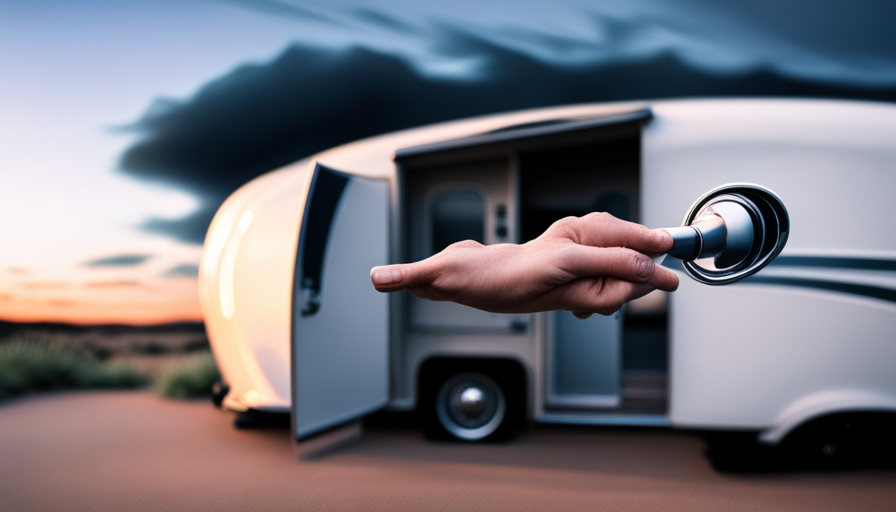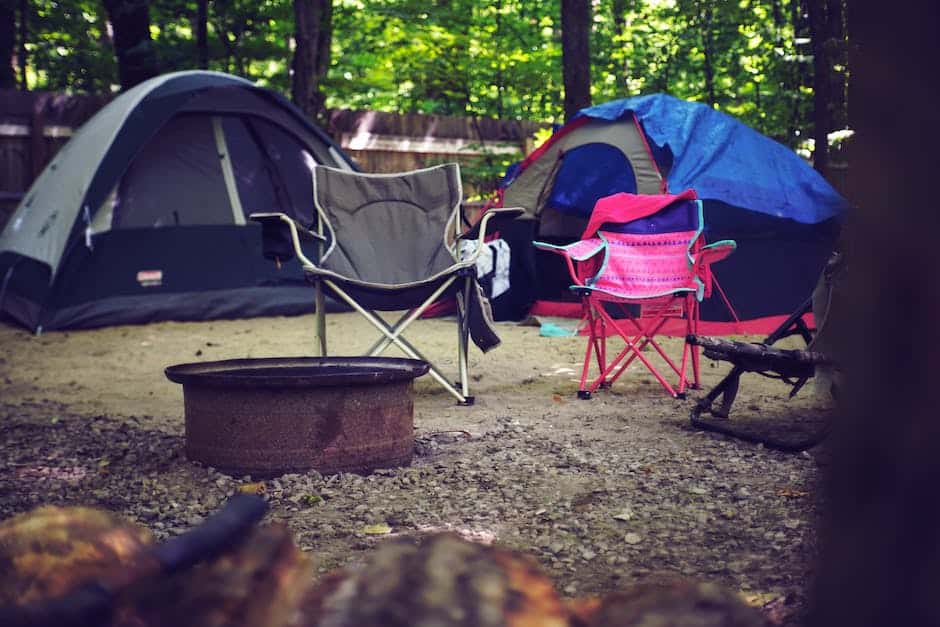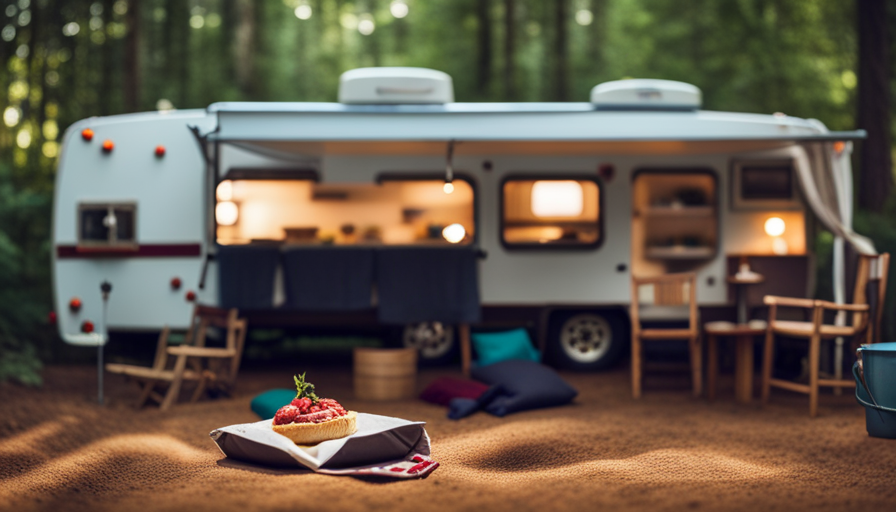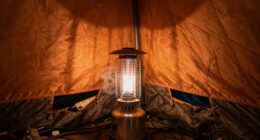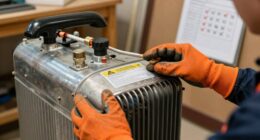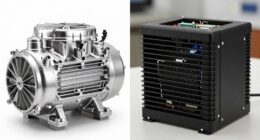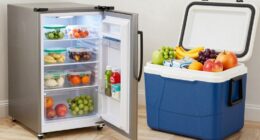Are you prepared to set off on the ultimate camping journey? Imagine yourself in an isolated spot, enveloped by stunning natural beauty, with your snug camper serving as your home away from home. However, there’s an issue. How can you ensure all your crucial devices and appliances are powered up without being tied to a campground? Worry not, fellow camping enthusiasts! We’ve got the answer to your power-related troubles: a generator.
Now, before you dismiss the idea, let me assure you that finding the right size generator for your camper is essential. It’s the key to ensuring a smooth and comfortable camping experience. In this article, we will guide you through the process of determining your power needs, calculating the total wattage, and choosing the perfect generator size for your small or medium-sized camper.
So, let’s dive in and take your camping adventures to the next level!
Key Takeaways
- Determine the power needs of your camper by making a list of appliances and their wattage
- Consider fuel costs and efficiency when choosing a generator for your camper
- Look for generators specifically designed for RV or camping use
- Consider factors such as noise level, fuel efficiency, and portability when choosing the right size generator for your camper
Determine Your Power Needs
Figuring out your power needs can be a bit overwhelming, but don’t worry, we’ve got you covered! When it comes to running a camper, it’s important to determine your power usage to ensure you have the right generator.
To do this, you’ll need to consider the appliances and devices you plan to use while camping. Make a list of everything that requires electricity and note down their wattage.
Once you have your list, compare the wattage of each item to the power output of different generator types. Generators come in various sizes and capacities, so it’s crucial to find one that can handle your power requirements. Some generators are designed specifically for campers and have features like quiet operation and fuel efficiency.
Calculating the total wattage needed will help you choose the right size generator for your camper. Add up the wattage of all the appliances and devices on your list to get a total power requirement. This will give you a better idea of the generator size you need to ensure all your electrical needs are met.
Now that you know how to determine your power needs, let’s move on to the next step: calculating the total wattage.
Calculate the Total Wattage
To determine the total wattage needed for your camper, you’ll want to add up all the electrical appliances and devices you plan on using during your trips. Calculating power consumption is crucial to ensure that your generator can handle the load.
Start by making a list of the appliances you’ll be using, such as the refrigerator, air conditioner, microwave, and lights. Each appliance should have a wattage rating listed on its label or in the user manual. Add up these wattages to determine the total wattage needed.
Estimating fuel costs is another important aspect of choosing the right generator size. Different generators have varying fuel efficiencies, so it’s essential to consider how long you’ll be running your generator and how much fuel it will consume. This will help you estimate the fuel costs associated with powering your camper.
When considering the type of generator, it’s important to take into account the total wattage calculated earlier. Different generators have different maximum wattage outputs, so you’ll want to choose a generator that can handle your camper’s power needs. Additionally, consider factors such as noise levels, portability, and fuel type when selecting the right generator for your camper.
Transitioning into the subsequent section, it’s vital to consider the type of generator that will best suit your camper’s power requirements.
Consider the Type of Generator
Choosing the right generator for your camper is like finding a superhero that can handle all your power needs. When considering the type of generator to use, there are a few important features to keep in mind.
First, look for a generator that is specifically designed for RV or camping use. These generators are usually quieter and more fuel-efficient, making them ideal for powering your camper.
Additionally, consider the size and weight of the generator. You want something that is portable and easy to transport, especially if you plan on moving around frequently.
Another important factor to consider is the generator’s maintenance requirements. Look for a generator that is easy to maintain and has readily available parts and service options. Regular maintenance is crucial to ensure your generator runs smoothly and efficiently. This includes regular oil changes, filter replacements, and general cleaning. Some generators even come with built-in features that make maintenance easier, such as automatic shut-off systems to prevent damage from low oil levels.
When choosing the right generator size for a small camper, it’s important to consider your power needs. A small camper typically requires a generator with a lower wattage output, around 1000-2000 watts. This will be enough to power your basic appliances such as lights, a small refrigerator, and a microwave. However, if you plan on running air conditioning or other high-power appliances, you may need a larger generator. It’s important to carefully consider your power needs and choose a generator that can meet them without overloading.
Choose the Right Generator Size for a Small Camper
Finding the perfect match for your small camper’s power needs requires careful consideration of the appropriate wattage output for your generator. When choosing a generator size for a small camper, it’s important to take into account factors such as generator noise levels and generator fuel consumption.
Generator noise levels can greatly impact your camping experience. No one wants to be bothered by a loud generator running in the background while they’re trying to relax in nature. Look for generators specifically designed for camping, as they’re often built with noise reduction technology. This will ensure a peaceful camping trip without disturbing your neighbors.
Generator fuel consumption is another important factor to consider. You don’t want to constantly be refilling your generator’s fuel tank, especially during longer camping trips. Look for generators that are fuel-efficient and have a longer run time. This will save you the hassle of constantly refueling and allow you to enjoy your camping trip without interruptions.
When choosing a generator size for a small camper, it’s crucial to consider factors such as generator noise levels and fuel consumption. By selecting a generator that minimizes noise and has efficient fuel consumption, you can ensure a pleasant and uninterrupted camping experience.
Now, let’s move on to discussing how to choose the right generator size for a medium-sized camper.
Choose the Right Generator Size for a Medium-Sized Camper
Imagine the freedom and comfort you’ll experience when your medium-sized camper is powered by the perfect generator, tailored to meet all your electrical needs. Determining the right generator size for a medium-sized camper is crucial to ensure that you have enough power to run all your appliances and devices while on the road.
To determine the power requirements of your camper, start by making a list of all the electrical appliances and devices you plan to use on a typical camping trip. This may include a refrigerator, air conditioner, microwave, TV, and charging stations for your electronic devices.
Once you have a list of your power requirements, you can explore the various generator options available. For a medium-sized camper, a generator with a power output between 2,000 and 3,500 watts should be sufficient. This will allow you to power all your essential appliances and devices without overloading the generator. Consider factors such as fuel efficiency, noise level, and portability when choosing the right generator for your needs.
Now that you have a better understanding of the power requirements and generator options for a medium-sized camper, it’s time to explore how to choose the right generator size for a large camper. Transitioning to a larger camper means increased power demands, and it’s important to select a generator that can handle the load.
Choose the Right Generator Size for a Large Camper
In our previous subtopic, we discussed how to choose the right generator size for a medium-sized camper. Now, let’s move on to determining the appropriate generator size for a large camper.
When it comes to a larger camper, it’s crucial to accurately estimate the power consumption of your appliances and devices. This will ensure that you choose a generator that can handle the increased load. To do this, make a comprehensive list of all the electrical equipment you plan to use in your camper.
Once you have determined your power requirements, the next step is comparing different generator brands. Look for generators that offer the wattage and features suitable for your large camper. Consider factors such as fuel efficiency, reliability, and ease of use.
To help you visualize the process, here are three key points to consider when choosing the right generator size for a large camper:
- Calculate the total power consumption of your appliances and devices.nn2. Research and compare generator brands that offer the necessary wattage.nn3. Consider factors such as fuel efficiency, reliability, and ease of use.
Now that we have covered choosing the right generator size for a large camper, let’s consider noise levels in the subsequent section.
Consider Noise Levels
When choosing the right generator for your large camper, it’s important to take into consideration the noise levels it produces. Generator noise levels are crucial, especially when camping in designated grounds where quiet hours are enforced. Excessive noise can disturb other campers and disrupt the peaceful environment.
To ensure a more enjoyable camping experience, here are some tips for reducing generator noise while camping.
Firstly, consider purchasing an inverter generator as they’re generally quieter compared to conventional generators. Inverter generators use advanced technology to produce cleaner and more stable power, resulting in reduced noise levels.
Additionally, place the generator as far away from your camping area as possible. This will help minimize the noise reaching your camper and the surrounding campers. You can also use noise-reducing materials, such as foam or rubber, to create a barrier around the generator, further reducing noise levels.
When selecting a generator for your large camper, it’s essential to prioritize noise levels to ensure a peaceful camping experience. By choosing a quieter inverter generator, placing it away from your camping area, and using noise-reducing materials, you can minimize disturbances and enjoy a more tranquil environment.
Transitioning into the subsequent section about ‘look for fuel efficiency,’ it’s also important to consider the noise levels of a generator when evaluating its overall performance and suitability for your camper.
Look for Fuel Efficiency
Get ready to save some serious cash at the pump with a fuel-sipping, wallet-friendly generator for your luxurious home on wheels! When choosing a generator for your camper, it’s crucial to consider fuel efficiency. Fuel efficiency refers to the amount of power a generator can produce for a given amount of fuel consumed. This is an important factor to consider because it directly impacts the cost of running your generator.
To determine the fuel efficiency of a generator, you need to look at its power consumption. Power consumption is the amount of energy the generator uses to produce the desired power output. Generators with lower power consumption are more fuel-efficient, meaning they’ll require less fuel to run for a longer period of time.
By choosing a fuel-efficient generator, you can significantly reduce your fuel expenses and extend the runtime of your camper’s power supply. This not only saves you money but also helps to minimize your carbon footprint. So, when shopping for a generator, be sure to check its fuel efficiency and power consumption ratings.
Now that you understand the importance of fuel efficiency, let’s move on to the next consideration: portability and weight.
Consider Portability and Weight
Make sure to think about how easy it’ll be for us to move and transport the generator, keeping in mind its weight and portability.
When considering a generator for your camper, it’s important to strike a balance between portability and power. A smaller, lighter generator may be easier to transport, but it may not provide enough power to run all of your appliances and devices. On the other hand, a larger, more powerful generator may be able to meet all of your electricity needs, but it may be heavier and harder to move around.
To determine the right generator size for off-grid camping, consider the power requirements of your camper. Look at the wattage ratings of your appliances and add them up to get an estimate of the total power needed. It’s also important to consider the starting wattage of appliances with motors, as they require additional power during startup. Once you have a rough estimate, choose a generator that can handle that load without being too heavy or cumbersome to transport.
When selecting a generator for your camper, it’s crucial to consider both its portability and power. Finding the right balance will ensure that you have a generator that’s easy to move and transport while still providing enough power for all your off-grid camping needs. To gain further insights, consult an expert or read user reviews to make an informed decision.
Consult an Expert or Read User Reviews
For a well-informed decision on the best generator for your camping needs, it’s like having a compass in the wilderness – consult an expert or dive into user reviews.
Consulting experts and comparing different generator models can provide valuable insights and help you make an informed choice.
When consulting experts, consider reaching out to professionals who specialize in generators or camping equipment. These experts can offer personalized advice based on your specific requirements and budget. They can guide you through the technical details, such as wattage requirements, fuel efficiency, noise levels, and compatibility with your camper. Their expertise can save you time and ensure you choose a generator that meets your needs.
User reviews can also be a valuable resource when comparing different generator models. Read reviews from camping enthusiasts who have already used the generators you are considering. Look for reviews that highlight the pros and cons, reliability, ease of use, and overall satisfaction. Pay attention to any common issues or recurring themes mentioned in the reviews. This will give you a better understanding of the generator’s performance and durability.
By consulting experts and reading user reviews, you can gather a wealth of information to help you choose the right generator for your camper. With this knowledge, you can confidently power your camping adventures and enjoy the great outdoors without worrying about power supply limitations.
Frequently Asked Questions
Are there any safety precautions I should take when using a generator for my camper?
When using a generator for your camper, it’s important to take certain safety precautions. Firstly, consider the generator noise level, as excessive noise can disturb nearby campers and wildlife.
Secondly, ensure that the generator is properly grounded to prevent electric shocks and fires. Follow the manufacturer’s instructions and use appropriate grounding equipment.
By adhering to these safety measures, you can enjoy your camping experience without compromising the well-being of others or yourself.
Can I run multiple appliances at the same time with a generator for my camper?
Running multiple appliances at the same time with a generator for your camper depends on the generator’s capacity. It’s crucial to consider the wattage requirements of each appliance and ensure that the generator can handle the combined load. Overloading the generator can lead to inefficiency or even damage.
It’s recommended to calculate the cumulative wattage of the appliances and select a generator with a capacity that exceeds this total to ensure optimal performance and avoid any power interruptions.
How long can a generator typically run on a full tank of fuel?
To determine how long a generator can run on a full tank of fuel, you need to calculate its fuel consumption. This can be done by dividing the generator’s fuel consumption rate (in gallons per hour) by the tank’s capacity (in gallons).
Tips for extending a generator’s running time include reducing the load by using energy-efficient appliances, maintaining proper maintenance, and avoiding overheating. Adhering to these practices will optimize fuel efficiency and prolong the generator’s operation.
Do generators require regular maintenance or servicing?
Generators, like any mechanical equipment, require regular maintenance to ensure optimal performance. Servicing frequency depends on factors such as usage, environment, and manufacturer recommendations.
It’s crucial to follow a maintenance schedule that includes tasks like oil and filter changes, spark plug inspection, and fuel system cleaning. Neglecting generator maintenance can lead to decreased efficiency, reliability issues, and potentially costly repairs.
Therefore, it’s essential to prioritize generator maintenance to maximize its lifespan and efficiency.
Are there any specific generator brands that are recommended for camper use?
When considering a generator for camper use, it’s important to prioritize generator noise levels and fuel efficiency. Some generator brands excel in these areas, making them recommended options.
By choosing a generator with low noise levels, you can ensure a peaceful camping experience. Additionally, fuel-efficient generators allow for longer operating times and minimize the need for frequent refueling.
Considering these factors will help you select a generator that meets your camper’s power needs efficiently and quietly.
Can I Use a Generator to Power an SUV While Towing a Camper?
When it comes to suv options for towing campers, using a generator to power an SUV is not recommended. Generators are designed to provide power to appliances and devices, not to physically move a vehicle and tow a camper. It is more practical and safer to use the SUV’s engine to power both the vehicle and the camper.
Conclusion
In conclusion, determining the right size generator for your camper is essential for a smooth and efficient camping experience. Just like a conductor leading an orchestra, we must calculate our power needs and consider the type of generator that matches our camper size.
It’s like finding the perfect instrument for each section of the ensemble. Additionally, we should pay attention to noise levels, fuel efficiency, and portability, ensuring our generator harmonizes with our camping lifestyle.
Consulting experts or reading user reviews is like seeking advice from seasoned musicians. By following these steps, we can find the perfect generator to power our camper and enjoy the symphony of nature without missing a beat.


